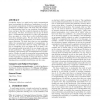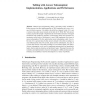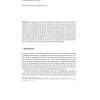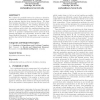123 search results - page 6 / 25 » Intelligence Analysis Using Quantitative Preferences |
117
Voted
ATAL
2008
Springer
15 years 4 months ago
2008
Springer
Complexity theory is a useful tool to study computational issues surrounding the elicitation of preferences, as well as the strategic manipulation of elections aggregating togethe...
147
click to vote
JELIA
2010
Springer
15 years 7 days ago
2010
Springer
Tabled Logic Programming (TLP) is becoming widely available in Prolog systems, but most implementations of TLP implement only answer variance in which an answer A is added to the t...
153
click to vote
ISAMI
2010
15 years 7 days ago
2010
It is recognized in Ambient Intelligence that ambient devices should be modeled as intelligent autonomous components rather than passive information sources. The agent paradigm sui...
116
click to vote
CIKM
2001
Springer
15 years 6 months ago
2001
Springer
This paper describes how an integrated web-based application, code-named FOCI (Flexible Organizer for Competitive Intelligence), can help the knowledge worker in the gathering, or...
104
click to vote
SIGECOM
2004
ACM
15 years 7 months ago
2004
ACM
We consider the parallels between the preference elicitation problem in combinatorial auctions and the problem of learning an unknown function from learning theory. We show that l...




